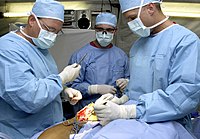
Photo from wikipedia
The development of experiential learning methodologies is gaining attention, due to its contributions to enhancing education quality. It focuses on developing competencies, and build-up added values, such as creative and… Click to show full abstract
The development of experiential learning methodologies is gaining attention, due to its contributions to enhancing education quality. It focuses on developing competencies, and build-up added values, such as creative and critical thinking skills, with the aim of improving the quality of learning. The interdisciplinary mechatronics field accommodates a coherent interactive concurrent design process that facilitates innovation and develops the desired skills by adopting experiential learning approaches. This educational learning process is motivated by implementation, assessment, and reflections. This requires synergizing cognition, perception, and behavior with experience sharing and evaluation. Furthermore, it is supported by knowledge accumulation. The learning process with active student’s engagement (participation and investigation) is integrated with experimental systems that are developed to facilitate experiential learning supported by properly designed lectures, laboratory experiments, and integrated with course projects. This paper aims to enhance education, learning quality, and contribute to the learning process, while stimulating creative and critical thinking skills. The paper has adopted a student-centered learning approach and focuses on developing training tools to improve the hands-on experience and integrate it with project-based learning. The developed experimental systems have their learning indicators where students acquire knowledge and learn the target skills through involvement in the process. This is inspired by collaborative knowledge sharing, brainstorming, and interactive discussions. The learning outcomes from lectures and laboratory experiments are synergized with the project-based learning approach to yield the desired promising results and exhibit the value of learning. The effectiveness of the developed experimental systems along with the adopted project-based learning approach is demonstrated and evaluated during laboratory sessions supporting different courses at Sanyo-Onoda City University, Yamaguchi, Japan, and at the American University in Cairo.
Journal Title: Education Sciences
Year Published: 2021
Link to full text (if available)
Share on Social Media: Sign Up to like & get
recommendations!